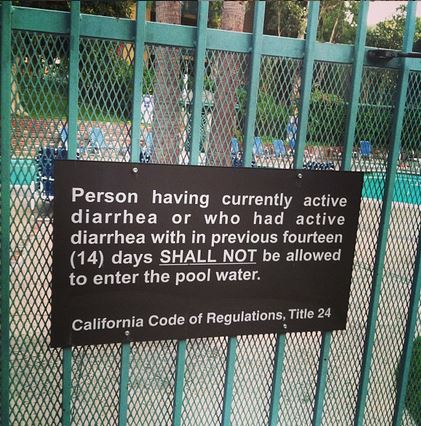A New Report Just Revealed Something Gross About Pools

By:
I have been afraid of pools and large bodies of water all my life, not just because I have reoccurring nightmares about 60-foot waves since childhood, but because I am a natural redhead with pale skin that fries under the sun. My parents made me swim in a t-shirt until I was 10 years old to lower my risk of getting melanoma, so I have always associated pools with anxiety, humiliation, and fear.
According to a new report by The Centers of Disease Control and Prevention, now I have another reason to steer clear of communal water spaces, as the number of illnesses related to pools and hot tubs has “significantly increased” in recent years.
Looking at more than 30 states and Puerto Rico, the CDC found 1,788 cases of outbreaks associated with pools from 2011 to 2012. Of those instances, there was one death and nearly 100 hospitalizations. The parasite cryptosporidium, which is found in fecal matter and known to bring about diarrhea, was found in half the incidences associated with treated recreational water, and E. Coli was found in 33 percent of cases associated with untreated recreational water. The CDC said this is a big cryptosporidium-related outbreak since the very first one was discovered in the U.S. 27 years ago. Cryptosporidium can live for up to 10 days, even in chlorinated water.
"This parasite is extremely chlorine-resistant," Michele Hlavsa, lead author of the report, told CBS News. "Swimmers bring it into the water when they are sick with diarrhea."
CBS News medical contributor Dr. Holly Phillips said on "CBS This Morning" that it is especially alarming to watch this transpire in treated pools.
"One of the most striking things about this report is that 77 percent of these outbreaks are happening in treated water," Dr. Phillips said. "We're talking pools, spas, hot tubs -- not in ponds and lakes, where we'd think these sort of things would usually proliferate."
Hlavsa told CBS News that pool regulations vary across the U.S., which the CDC describes as a "potential barrier to preventing and controlling outbreaks associated with" these pools.
"There are different standards and people are responding differently," Hlavsa told CBS News. "We need a certain set of standards and it should be the same across the country."

The CDC recommends the obvious choice for those who want to take their chances and swim in pools this summer: shower before swimming, do not swallow the water, do not swim if you have diarrhea, and do not urinate or defecate in pools.
Here are some related tweets:
